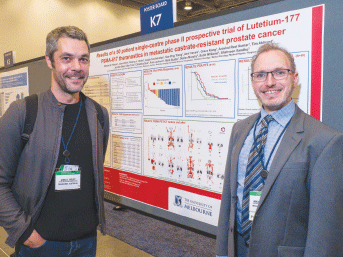In a prospective, single-center, single-arm phase II trial reported at the 2019 Genitourinary Cancers Symposium, a novel approach using a tumor-specific radioligand therapy that binds to prostate-specific membrane antigen (PSMA) (lutetium-177 PSMA-617 -[LuPSMA]) achieved responses in a majority of men with metastatic castration-resistant prostate cancer that had progressed on standard therapies.1 High prostate-specific antigen (PSA) response rates were observed with low toxicity in this heavily pretreated group of patients with aggressive disease. High response rates were also found in men who were re-treated with LuPSMA after disease progression. Although the study was not powered to look at survival, given the absence of a control arm, men who received LuPSMA lived a median of 13.3 months after treatment, exceeding the expected survival of 9 months in this setting.

In this trial, we treated men who would have otherwise been directed to palliative care.— Michael Hofman, MBBS
Tweet this quote
This is the first prospective study of LuPSMA, explained lead author Michael Hofman, MBBS, Professor of Nuclear Medicine at the Peter MacCallum Cancer Centre, Melbourne, who presented the results based on a cohort of 50 patients, expanded from the first 30 patients enrolled in the phase II trial, which was previously reported in The Lancet Oncology.2 The recent findings confirm the activity of LuPSMA, and based on these results, two randomized controlled trials are underway to compare LuPSMA vs cabazitaxel (the ANZUP/PCFA TheraP trial) and LuPSMA vs best standard of care (the Endocyte VISION study, a U.S. registration trial).
Unmet Therapeutic Need
“In this trial, we treated men who would have otherwise been directed to palliative care. It’s exciting to see that LuPSMA can potentially offer benefits for many men with these very aggressive cancers, with few side effects and significant improvements in quality of life. Importantly, we saw a continued benefit with LuPSMA retreatment in some men whose cancer progressed,” Dr. Hofman said.
LuPSMA is a small molecule–targeting ligand that selectively targets PSMA, which is commonly expressed on prostate cancer cells, attached to lutetium-177, a radioactive payload. LuPSMA is designed to deliver high doses of radiation to prostate cancer metastases, while avoiding radiation damage to normal cells.
We saw a continued benefit with LuPSMA retreatment in some men whose cancer progressed.— Michael Hofman, MBBS
Tweet this quote
The half-life of the compound is 7 days. LuPSMA emits beta particles that travel around 1 mm and cause tumor death, and also low levels of gamma rays that can be visualized with nuclear imaging, which enables clinicians to determine whether the disease is regressing.
Dr. Hofman noted that other radioligands are under development in prostate cancer. “This includes using the same compound labeled to the alpha emitter actinium-225, rather than a beta emitter like lutetium-177. Alpha emitters travel a much shorter distance but deliver much greater energy, and therapy results in more cellular damage to both tumors and normal tissue,” he said.
Study Details
Patients enrolled in the phase II study were diagnosed with PSMA-positive metastatic castration-resistant prostate cancer by upfront positron-emission tomography (PET) scan. All men had disease progression on prior treatment, and the median PSA doubling time at study entry was 2.6 months. The majority of patients had received prior docetaxel (84%) or abiraterone acetate plus prednisone or enzalutamide (90%). Just under half (48%) had received prior second-line cabazitaxel.

Michael Hofman, MBBS (right), and John A. Violet, MBBS, PhD, presented poster results from a 50-patient single-center phase II prospective trial of Lutetium-177 PSMA-617 theranostics in metastatic castration-resistant prostate cancer. Photo by © ASCO/Todd Buchanan 2019.
The men received up to 4 cycles of LuPSMA given intravenously every 6 weeks in an outpatient setting. PSA levels were determined and imaging (computed tomography or PET) was performed to assess response. The primary endpoints were PSA response and toxicity.
A PSA decline ≥ 50% was observed in 32 of 50 patients (64%), including 22 patients (44%) with a PSA decline ≥ 80%. Among 27 patients with soft-tissue disease at baseline, 56% had a partial or complete response according to Response Evaluation Criteria in Solid Tumors. Patients, however, subsequently experienced disease progression, with a median time to PSA progression of 6.9 months. The overall survival in patients with PSA decline ≥ 50% was 18 months. Fourteen patients with disease progression on LuPSMA received a median of 2 more cycles of LuPSMA; a PSA decline ≥ 50% was observed in 9 patients (64%). Median survival in this group was 33 months.
Adverse events were similar to those reported earlier in 30 patients. They included transient grade 1 to 2 dry mouth (64%), nausea (48%), and fatigue (36%). Grade 3 to 4 thrombocytopenia and anemia were each seen in about 10% of patients.
Bringing this novel therapy earlier in the treatment of prostate cancer may result in better outcomes.— Michael Hofman, MBBS
Tweet this quote
LuPSMA TRIAL
- LuPSMA is a novel radioligand therapy that binds lutetium-177 to prostate-specific membrane antigen and delivers radiation to prostate cancer cells circulating in the body.
- This new form of treatment had a strong showing in men with metastatic PSMA-positive castration-resistant prostate cancer who had disease progression on standard therapies and would have otherwise been candidates for palliative care.
When asked whether LuPSMA might be used earlier in the course of disease, Dr. Hofman said: “Bringing this novel therapy earlier in the treatment of prostate cancer may result in better outcomes. There are possibilities in using this treatment in patients with high-risk localized prostate cancer all the way through to the advanced metastatic disease setting. Using this treatment early on has the potential to result in cure, particularly when combined with existing standards of care. This needs to be evaluated carefully in well-designed clinical trials, as there is a risk for side effects that we don’t see when using it in patients with advanced disease.” ■
DISCLOSURE: Dr. Hofman has received institutional research funding from Endocyte and chairs the ANZUP/PCFA TheraP trial, which received funding from Endocyte, and has received honoraria and travel expenses from Ipsen and Sanofi Genzyme.
REFERENCES
1. Hofman M, Violet JA, Hicks RJ, et al: Results of a 50-patient single-centre phase II prospective trial of lutetium-177 PSMA-617 theranostics in metastatic castrate-resistant prostate cancer. 2019 Genitourinary Cancers Symposium. Abstract 228. Presented February 14, 2019.
2. Hofman M, Violet JA, Hicks RJ, et al: [177Lu]-PSMA-617 radionuclide treatment in patients with metastatic castration-resistant prostate cancer (LuPSMA trial): A single-centre, single-arm, phase 2 study. Lancet Oncol 19:825-833, 2018.



